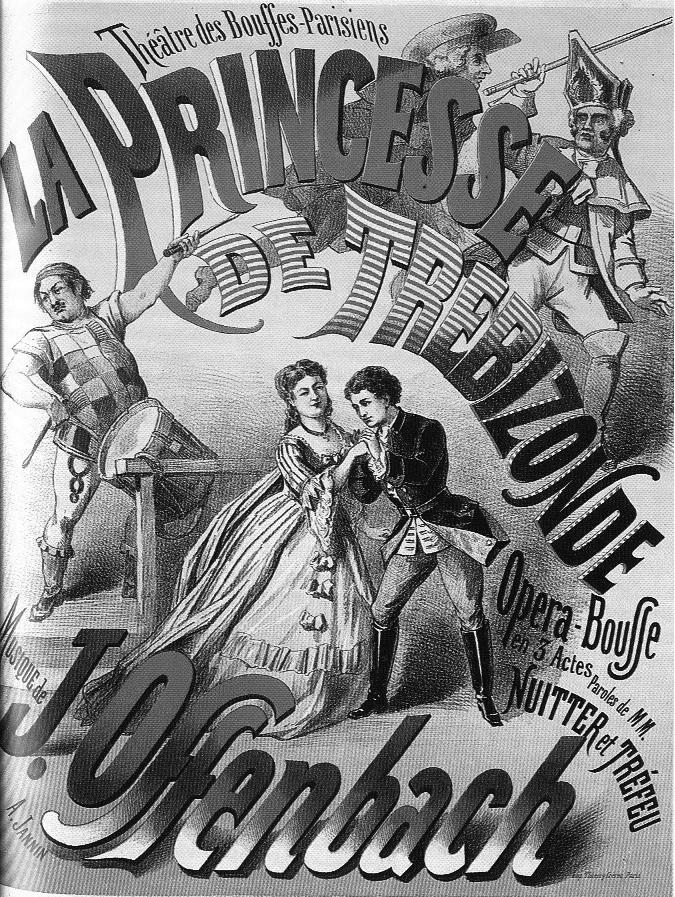
2 minute read
Programme note
‘It really is regrettable that you cannot make up your mind to come. Tréfeu on his own is totally useless, just as you are on your own. You must either come together or not at all.’ In fact, La Princesse de Trébizonde was a ‘Bouffes-Parisiens’ project through and through, because the summer Prussian premiere, in BadenBaden, was performed by the vacationing troupe from the famous Bouffes-Parisiens theatre, founded 14 years earlier by Offenbach in Passage Choiseul, before they opened the new season in Paris. As always, Offenbach was not content with setting Nuitter’s verse to music. He took an active hand in the writing of the libretto, offering advice and making changes: ‘You see what must be done and above all what must be undone.’ In Baden-Baden, rehearsals had been in full swing from the start of the summer. They rehearsed during the day, and, in the evening, they performed the Bouffes-Parisiens repertoire for a largely aristocratic audience, which particularly favoured one-act works: La Chanson de Fortunio, Le Mariage aux lanternes, Les Bavards, L’Ile de Tulipatan, etc. According to rumours about the new operetta, ‘Offenbach’s musical talent has never been more effortless nor more boldly original.’ Changes were being made to the score right up to the premiere, although this did not prevent the composer from spending a fortune at roulette or mulling over Les Brigands between two rehearsals. On 31 July 1869, the curtain rose on La Princesse de Trébizonde with Offenbach conducting. Blavet wrote for Le Figaro: ‘It was a wonder to see that little man, standing on the rostrum, conducting as if possessed which, according to Voltaire, is the sign of genius, that prodigious orchestra of Baden-Baden, the best to be heard under the sun ... of the casinos.’ In the audience were several crowned heads. The prefect of Strasbourg had made the short trip over the Rhine. Also in the audience was the famous courtesan, Valtesse de La Bigne, who, rumour had it, could not deny Offenbach anything ... until Madame Offenbach put an end to that relationship with the help of a police inspector.
The performers were a huge success, and the music was warmly applauded and encored several times. Although the plot was considered confusing by some, the plot also seemed to be a hit with the audience, which puzzled Tréfeu. The perceptive author wrote to his colleague Nuitter the day after the premiere: ‘The piece was as successful as it could it have been. The story is amusing, and the music very well executed. Nevertheless, I have some reservations about the piece. A great deal needs to be rewritten. The haste with which it was brought to stage has clearly had an adverse effect.’ The press, however, was fulsome in its praise. Blavet wrote in Le Figaro: ‘Offenbach has only included real gems, and if he has erred on occasion, this score makes up for all his lapses. He can show up on Judgment Day holding Orphée in one hand and La Princesse de Trébizonde in the other; he is sure to be appointed the Good Lord’s Choirmaster.’
The most popular numbers were the Grand Duo between Raphael and Zanetta, the Hunters’ chorus and the ‘Ronde de la Princesse’, themes that the composer introduced to the audience in the overture, along with the ‘Ronde des Pages’, and the ‘Grand Galop from the third act. Offenbach received unanimous acclaim for his musical art, an alchemy combining tenderness and extravagance with characteristic skill.
The composer did not linger long in Baden-Baden. The few remaining months before the reopening of the Bouffes-Parisiens did not allow the composer and his librettists enough time to make the required alterations to the work. As a result, the Paris premiere had to be









